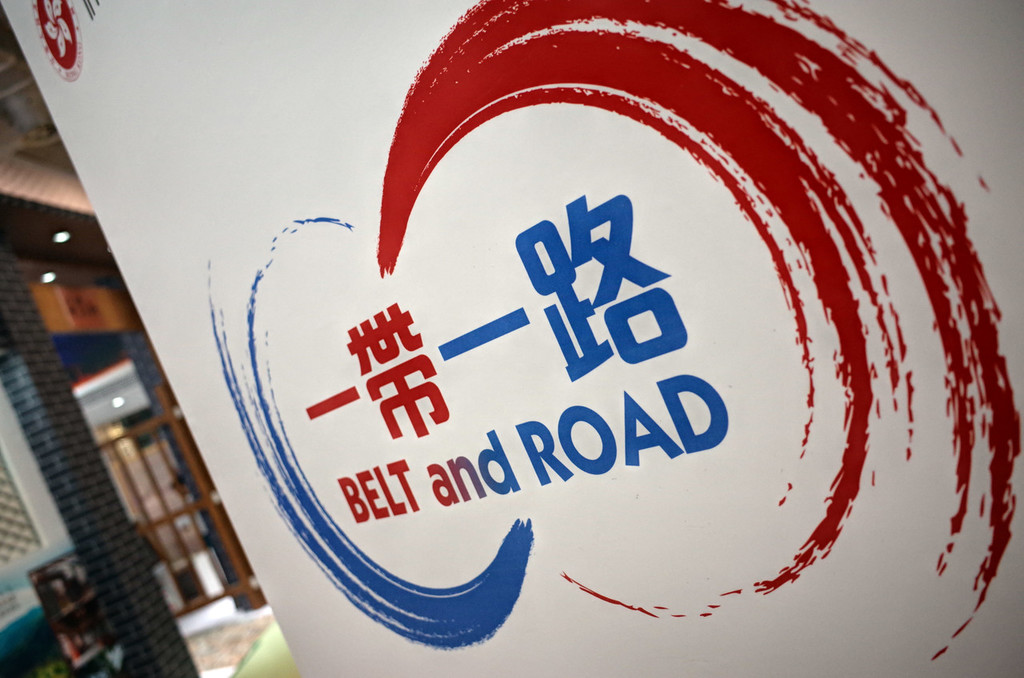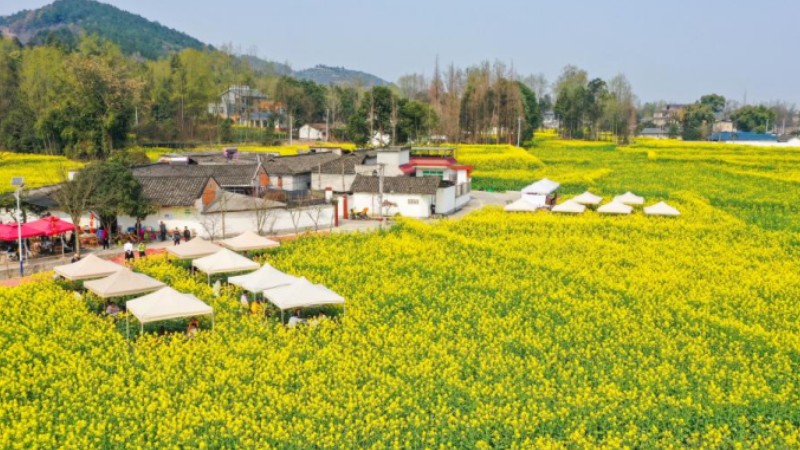Major events can promote global prosperity

[Photo/Xinhua]
Experts say forums on BRI and other issues will promote stable and safe interaction.
A series of planned major events high on the schedule of China's diplomacy at home — especially one to celebrate the Belt and Road Initiative's 10th anniversary — will further convince the world of the country's sincerity and policy consistency in terms of opening-up to the outside world and bolstering global prosperity, veteran officials and scholars told China Daily.
These policy insiders are attending the annual two sessions in Beijing as members of the 14th National Committee of the Chinese People's Political Consultative Conference, the country's top political advisory body.
In recent months, officials from the Ministry of Foreign Affairs have confirmed that China will work with various parties to host a major diplomatic event this year — the third Belt and Road Forum for International Cooperation.
They said China is willing to take the 10th anniversary of the Belt and Road Initiative as an opportunity to look back and build on the BRI's achievements, draw up a blueprint and further advance its high-quality development with the attendees.
President Xi Jinping first proposed the two most important components of the Belt and Road Initiative — the Silk Road Economic Belt and the 21st Century Maritime Silk Road — in 2013.
The first and second Belt and Road Forums for International Cooperation were held in Beijing in 2017 and 2019, respectively, bringing together dozens of foreign heads of state, government leaders and chiefs of key international organizations, such as the United Nations.
Some countries have already responded positively to news of this year's Belt and Road forum.
During a meeting last month, Emmanuel Bonne, diplomatic adviser to French President Emmanuel Macron, told Wang Yi, a member of the Political Bureau of the Communist Party of China Central Committee and director of the Office of the Central Foreign Affairs Commission, that France is willing to earnestly participate in the forum.
China has already signed more than 200 cooperation documents with 151 countries and 32 international organizations to build the BRI, doubled its trade in goods and increased its direct investment in countries along the initiative's routes by 80 percent.

ZHANG YUJUN/FOR CHINA DAILY
Poverty alleviation
According to a 2019 World Bank report, "BRI transportation projects could help lift 7.6 million people out of extreme poverty" (those earning less than $1.90 a day), and "32 million people from moderate poverty" (less than $3.20 a day).
Gu Xueming, president of the Chinese Academy of International Trade and Economic Cooperation in Beijing and a member of the 14th CPPCC National Committee, said, "The Belt and Road Initiative originated in China, but the opportunities and results it has brought belong to the whole world."
He added that looking back on the past 10 years, BRI construction has maintained great vitality, and the initiative has responded to the needs of the times via China's role and contribution.
Gu cited the example of a Chinese company that invested in a pharmaceutical factory in the West African country of Mali under the China-Africa Public Health Plan. With the start of mass production at the factory, Mali not only ended its history of reliance on imported drugs but also significantly reduced the price of medication in its home market. At the same time, the factory gave rise to the development of upstream and downstream industries, Gu said.
"When we are looking ahead, the prospects are bright and the tasks are mounting. This requires substantial efforts in BRI construction, more Chinese wisdom and Chinese solutions, and a high level of China's opening-up in order to build a community with a shared future and improve global governance," he added.
Hu Sishe, former vice-president of the Chinese People's Association for Friendship with Foreign Countries and a member of the 14th CPPCC National Committee, said it is necessary to further improve person-to-person contacts between China and countries along BRI routes.
He called for full play to be given to the role of existing friendships between Chinese and foreign sister cities, along with more sister city exchanges and cooperation under the context of the BRI to build a solid foundation for exchanges at the local level between China and participating countries.
"I recommend piloting more dialogue and exchanges with historic and cultural cities along BRI routes, in particular dialogue and exchanges with those in Europe and in West Asian and North African countries, thus boosting the resonance and common language with countries along the routes," he said.
Prospering together
When he met with a South Korean entrepreneur in Beijing last month, Liu Jinsong, director of the Foreign Ministry's Department of Asian Affairs, said that in addition to the third Belt and Road Forum for International Cooperation, China will host the annual Boao Forum for Asia and the China-ASEAN Expo this year.
"These major events will provide important platforms for China to deepen exchanges and cooperation with other countries", and "businesses from Asian countries are enjoying multiple enabling factors in their cooperation with China", Liu was quoted as saying in a news release on the Foreign Ministry's website.
Chinese officials and scholars said opening to the outside world is a win-win situation for both China and its foreign partners, and by China spreading its arms and reach to the world, both sides enjoy many mutual benefits.
From 2001 to 2021, the first 20 years after China's accession to the World Trade Organization, the country's total economic output rose from sixth largest in the world to second largest, and it has become a major trading partner of more than 140 countries and regions, according to the Ministry of Commerce. Between 2013 and 2021, China's annual contribution to global economic growth averaged 38.6 percent, larger than the combined contribution of the Group of Seven countries.
Although the global economy has continued to suffer from the impact of the COVID-19 pandemic in the past year, major international exhibitions such as the Canton Fair and the China International Import Expo were held as scheduled, providing highlights amid the global economic downturn, experts said.
Yang Guangbin, a member of the 14th CPPCC National Committee and dean of the School of International Relations at the Renmin University of China, said, "Instead of taking a winner-takes-all approach, China is sincerely committed to building the Belt and Road together in order to promote the common development of countries along the routes.
"China has proved its ability by co-founding the buildup of the Belt and Road Initiative and the Asia Infrastructure Investment Bank, and the community with a shared future for humanity it advocates is also an approach to adjusting the established world order that features some inequalities. China has become an important player in perfecting the established order."
Observers have noted that the international situation has become increasingly complex at a time when global peace and development are facing serious challenges, including the spillover effect of the lingering Ukraine crisis and US coercion and verbal attacks on China.
Zhao Mei, a senior research fellow with the Institute of American Studies at the Chinese Academy of Social Sciences and a member of the 14th CPPCC National Committee, said, "The external environment for China's economic development is facing dire challenges, and world peace and development are undergoing the most severe tests since the end of the Cold War."
She pointed out that "the changes in China-US relations are the most prominent part of the changing global landscape not seen in a century. At present, China-US ties are faced with serious challenges, and the international community also has many misunderstandings about China's development and China's path for development."
The National Security Strategy Report released by the Biden administration last year claimed that China "harbors the intention and, increasingly, the capacity to reshape the international order in favor of one that tilts the global playing field to its benefit", Zhao noted.
"There's still a long way to go in telling the Chinese story to the world in an effective manner," she said.
Path to modernization
In October, the report to the CPC's 20th National Congress made it clear that the Chinese path to modernization is one that "follows the path of peaceful development".
Scholars said this viewpoint is conducive to convincing the international community of China's consistent dedication to global stability and prosperity.
China is the only country in the world that has enshrined its adherence to the path of peaceful development in its constitution, and it is the only one of the "five nuclear-weapon states" that has pledged not to be the first to use such weapons.
China has never taken the initiative to provoke conflict or war, let alone resort to force or the threat of force, Chinese diplomats said in recent public speeches, adding that the country's development has always represented a growing force for peace in the world.
Jia Qingguo, a member of the 14th CPPCC National Committee and director of the Institute for Global Cooperation and Understanding at Peking University, said that this method of achieving modernization via the path of peaceful development is "based on history and reality" and it contributes Chinese wisdom to the solution of human problems. It rebuts the Clash of Civilizations theory and the stereotypical belief that "a powerful nation will surely become a hegemony", Jia said.
"More than 70 years after the founding of the People's Republic of China, the CPC and the Chinese people, who have endured major sufferings, know well the rarity of peace and the value of development, and they take it as their lofty duty to promote world peace and development," he said.
He added that in the face of the challenge of a growing deficit in global peace, development, security and governance, President Xi proposed the Global Development Initiative in 2021 and the Global Security Initiative last year.
These "provide a Chinese solution for the common development and progress of all countries in the world", Jia said.
Improving world governance
Experts said China's participation in the reform and strengthening of the global governance system and its commitment to genuine multilateralism — as manifested by the fresh initiatives and road maps for coordinated global efforts — are helping to advance global governance and making it more fair, just and reasonable.
"The established global governance model is currently challenged and seems unsustainable, and a new global governance model needs to be explored in a coordinated approach," said Liu Xianzhong, a member of the 14th CPPCC National Committee and director of the Department of Russian History and Culture at the Institute of Russian, East European and Central Asian Studies with the Chinese Academy of Social Sciences.
"Countries should resort to reconciliation and resolve global governance issues in the spirit of building a community with a shared future. Only when the world is a success can China be successful. A better China also contributes to a better world."
Liu said China's economy is deeply integrated with the global economy, having a high degree of interconnectivity and interdependence in industries with many countries around the world.
"China's unswerving pursuit of a mutually beneficial, win-win opening-up strategy will enable the country to benefit from driving forces worldwide for its development, and the pursuit also allows China's development to better benefit the world," he said.
In the field of politics and security, Liu stressed that countries should not engage in cliques and group confrontation, and they should mobilize global resources to address global challenges and promote greater global development.
"The success of one country does not necessarily mean the failure of another. Flexing military muscle frequently is a hegemonic approach that can only lift stones and hit one's own feet," he said. "No country can seek its own absolute security on its own. No country can achieve its own security without the security of the world."
Yang, from the Renmin University of China, noted that the Chinese path to modernization, "bearing the genes of Chinese civilization, has brought new values and elements to the new international order".
He noted that the socialist system with Chinese characteristics has learned from some of the successful economic management experiences of developed countries, and it has stood out in globalization.
"The Chinese experience provides a Chinese solution and Chinese inspiration for developing countries that want to develop while maintaining their independence," he said.
Photos
Related Stories
- Belt and Road Initiative participated by three-fourths of world's countries: FM
- Belt and Road Initiative a high-quality public good: Chinese FM
- Belt and Road Initiative creates 420,000 jobs for participant countries: FM
- China to host 2 major diplomatic events: FM
- Chinese dredger contributes to high-quality construction of Belt and Road
- Belt and Road Initiative promotes economic growth, improves people's lives: spokesperson
- China, Belt and Road countries enjoy closer trade ties
- Built by China: A decade of Belt and Road construction
- 10 years on, BRI is humming
- Foreign diplomats in China refute ‘debt trap’ hype by Western media
Copyright © 2023 People's Daily Online. All Rights Reserved.









